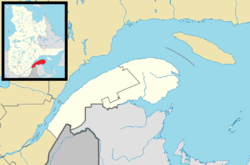Mont-Saint-Pierre is a village municipality in Quebec, Canada, located in the regional county municipality of La Haute-Gaspésie in the administrative region of Gaspésie–Îles-de-la-Madeleine.
Mont-Saint-Pierre | |
|---|---|
 | |
 Location within La Haute-Gaspésie RCM | |
| Coordinates: 49°13′21″N 65°48′26″W / 49.22250°N 65.80722°W[1] | |
| Country | Canada |
| Province | Quebec |
| Region | Gaspésie–Îles-de-la-Madeleine |
| RCM | La Haute-Gaspésie |
| Settled | 1858 |
| Constituted | January 1, 1947 |
| Government | |
| • Mayor | Magella Emond |
| • Federal riding | Haute-Gaspésie—La Mitis—Matane—Matapédia |
| • Prov. riding | Gaspé |
| Area | |
• Total | 51.78 km2 (19.99 sq mi) |
| • Land | 52.07 km2 (20.10 sq mi) |
| There is an apparent contradiction between two authoritative sources. | |
| Population | |
• Total | 186 |
| • Density | 3.6/km2 (9/sq mi) |
| • Pop (2016-21) | |
| • Dwellings | 133 |
| Time zone | UTC−5 (EST) |
| • Summer (DST) | UTC−4 (EDT) |
| Postal code(s) | |
| Area code(s) | 418 and 581 |
| Highways | |
| Website | www |
The village is located at the foot of the eponymous Mount Saint-Pierre. This 411 metres (1,348 ft) high mount juts into the Gulf of Saint Lawrence, separating Cove Mont-Louis from Cove Mont-Saint-Pierre, into which the Mont-Saint-Pierre River flows. The place was formerly called Rivière-à-Pierre.[1]
The 2021 census there were 186 inhabitants.
Mont-Saint-Pierre is well known for hang-gliding and paragliding, and home to the Mont-Saint-Pierre Ecological Reserve. The Festival of Free Flight (Fête de Vol Libre) is held each year since 1978.
History
editPermanent settlement occurred in 1858. Its post office opened in 1904. In 1947, the village was incorporated when it separated from Mont-Louis.[1]
Demographics
editIn the 2021 Census of Population conducted by Statistics Canada, Mont-Saint-Pierre had a population of 186 living in 98 of its 133 total private dwellings, a change of 20% from its 2016 population of 155. With a land area of 52.07 km2 (20.10 sq mi), it had a population density of 3.6/km2 (9.3/sq mi) in 2021.[3]
| 2021 | 2016 | 2011 | |
|---|---|---|---|
| Population | 186 (+20.0% from 2016) | 155 (-19.3% from 2011) | 192 (-16.5% from 2006) |
| Land area | 52.07 km2 (20.10 sq mi) | 52.39 km2 (20.23 sq mi) | 53.20 km2 (20.54 sq mi) |
| Population density | 3.6/km2 (9.3/sq mi) | 3.0/km2 (7.8/sq mi) | 3.6/km2 (9.3/sq mi) |
| Median age | 61.6 (M: 60.8, F: 62.0) | 61.2 (M: 59.5, F: 61.7) | 58.2 (M: 56.0, F: 60.0) |
| Private dwellings | 133 (total) 98 (occupied) | 139 (total) | 130 (total) |
| Median household income | $.N/A | $36,160 | $.N/A |
As of 2021, the population speaks almost exclusively French. The breakdown of mother tongues is:[3]
- English as first language: 0%
- French as first language: 94.6%
- English and French as first language: 0%
- Other as first language: 2.7%
|
| |||||||||||||||||||||||||||||||||||||||||||||||||||
| Source: Statistics Canada[9][10] | ||||||||||||||||||||||||||||||||||||||||||||||||||||
See also
editReferences
edit- ^ a b c d "Banque de noms de lieux du Québec: Reference number 42208". toponymie.gouv.qc.ca (in French). Commission de toponymie du Québec.
- ^ a b c "Répertoire des municipalités: Geographic code 04015". www.mamh.gouv.qc.ca (in French). Ministère des Affaires municipales et de l'Habitation. Retrieved 2024-08-13.
- ^ a b c d e "Mont-Saint-Pierre (Code 2404015) Census Profile". 2021 census. Government of Canada - Statistics Canada. Retrieved 2024-08-13.
- ^ "2021 Community Profiles". 2021 Canadian census. Statistics Canada. February 4, 2022. Retrieved 2023-10-19.
- ^ "2016 Community Profiles". 2016 Canadian census. Statistics Canada. August 12, 2021. Retrieved 2022-07-14.
- ^ "2011 Community Profiles". 2011 Canadian census. Statistics Canada. March 21, 2019. Retrieved 2013-05-17.
- ^ "2006 Community Profiles". 2006 Canadian census. Statistics Canada. August 20, 2019.
- ^ "2001 Community Profiles". 2001 Canadian census. Statistics Canada. July 18, 2021.
- ^ 1996, 2001, 2006, 2011, 2016, 2021 census
- ^ "1971 Census of Canada - Population Census Subdivisions (Historical)". Catalogue 92-702 Vol I, part 1 (Bulletin 1.1-2). Statistics Canada: 76, 139. July 1973.
